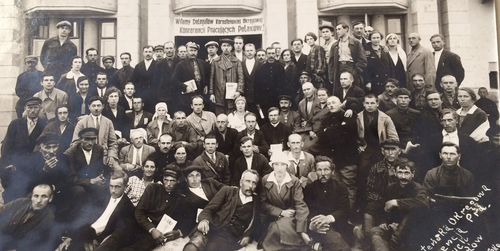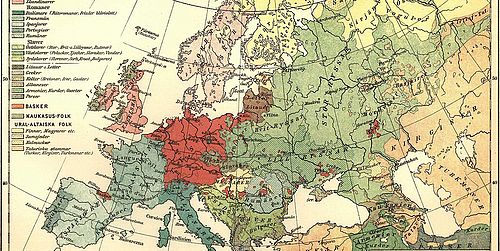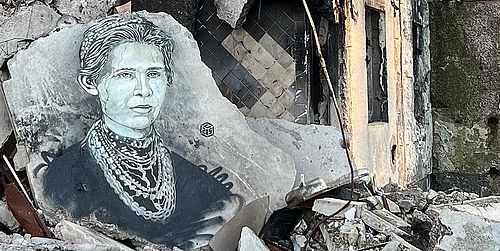A Joint Ukrainian-Swiss Research Project, supported by the Swiss National Science Foundation "Testing the Soviet Utopia: The Social History of Technologies in Ukraine, 1922-1991"
The project explores relationships between modern technologies, their emergence and use, and social and cultural change in Ukraine under Soviet rule (1922-1991). During this period, all production facilities were nationalized, technologies and their development were subject to centralized planning, and the Soviet state defined pathways for the distribution of goods. This system, radically distinct from market economies, both provided the foundations for specific Soviet designs of technological systems and encompassed, and potentially obscured, a much more complex reality, involving conflicting visions of technological development held by various lobby groups and arising from divergent points of view. The ideological frontier between “East” and “West” did not prevent the frequent transfer of Western technological innovations and solutions nor their implementation; the result was an often striking uniformity in global technological developments. In the meantime, under the radar of official ideology, citizens of the Soviet Union, including the Ukrainian Soviet Republic, practiced their own culture of the use, modification, and repair of technologies, which both helped to fill the gaps in supply of state-produced goods and, at times, gave rise to discontent and resistance.
SNF-Prima Projekt: "Red Tower of Babel: Soviet minorities experiment in interwar Ukraine"
This project aims to provide a unique account of the Soviet minority experiment as designed and implemented during the 1920s-early 1930s within the borders of Soviet Ukraine. Soviet Ukraine served as a trendsetting laboratory for Soviet minorities policy Union-wide. Unlike most studies on the Soviet nationality policy, this project makes Soviet ethnic minorities its primary focus, scrutinising the Soviet minority experiment at various levels of power, from top to bottom. At the top level, it looks at the state strategies to organise the society along the ethnic lines; at the middle local level it studies how local party officials and minority specialist translated the state-imposed vision of ethnic proliferation to the local conditions. Lastly, at the bottom level it looks at the way education and cultural workers adapted and carried out those programmes on the ground, and investigates how people digested the new ethnic regime and adapted (if at all) their everyday life to the new expectations. The primary material gathered by the project, combined with its theoretical framing and comprehensive perspective, will form a significant and original contribution to the historiography of the Soviet and Eastern European interwar-period studies.
Study Group for Minority History
The Study Group for Minority History (SGMH) is a forum devoted to the study of minority groups in the national and regional histories of Central, Eastern and Southeastern Europe from the Napoleonic Wars to the contemporary past. Its key aim is to assist scholars, currently working in this area of inquiry by fostering international networks to help promote and share their research. It also seeks to encourage collaborative forms of scholarship across different aspects of minority history such as the evolution of identity, diaspora-formation, inter-communal engagements, the development of cultural institutions, relations with states and state actors and the impact of regional conflicts. In addition, the SGMH aims to encourage the use of new methodologies, interdisciplinary scholarly approaches and theoretical frameworks in the study of minority groups.
Podcast-Series 'Eastern Europe's Minorities in a Century of Change'
"Eastern Europe's Minorities in a Century of Change", a podcast series on the history of minorities and minority experiences in twentieth-century Central and Eastern Europe prepared by the Study Group for Minority History. The co-conveners of the Study Group are Olena Palko (Birkbeck), Samuel Foster (University of East Anglia) and Raul Cârstocea (Maynooth University).
The podcast is available on Spotify, Apple Podcasts, and SoundCloud.
SNF-Projekt: Gender and nation in the biographical interpretations of Lesya Ukrainka’s life and works: Ukraine-Russian Empire-USSR, 1898-2022
Lesya Ukrainka (1871-1913) is undoubtedly the most significant figure in Ukrainian women’s literature: her works are full of both mythical and historical heroines torn between tradition and modernity; she wrote comparative studies on the European women’s literature of her time; and she has played (and still plays) a major role in feminine and Ukrainian emancipations.
Due to her emancipatory ideas, Ukrainka’s works enjoyed unparalleled popularity during the Russian Empire, in the USSR and in post-1991 Ukraine. But they have been the subject of contradictory interpretations.
The aim of this project is therefore to understand how biographical studies of Ukrainka have transformed her into a mythical figure who is a projection of the dominant ideologies of the three aforementioned eras.




